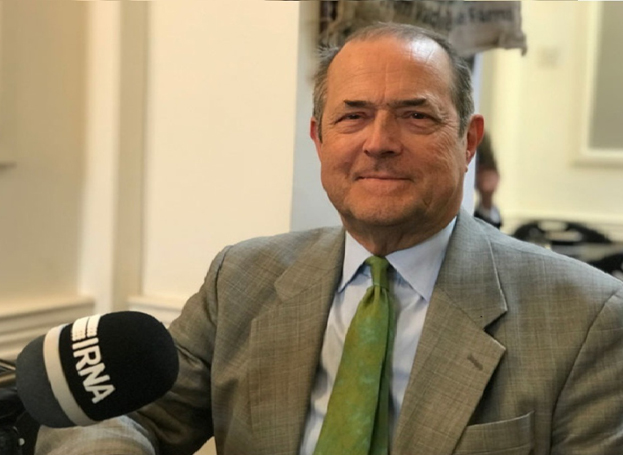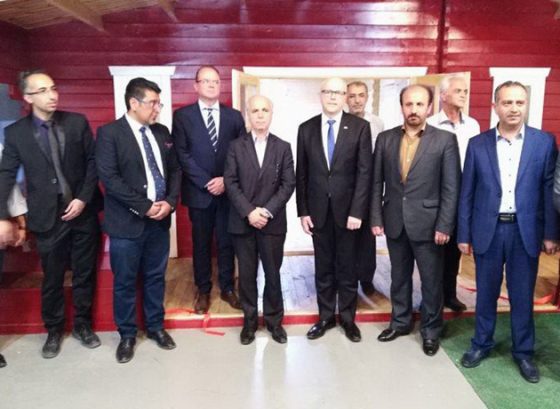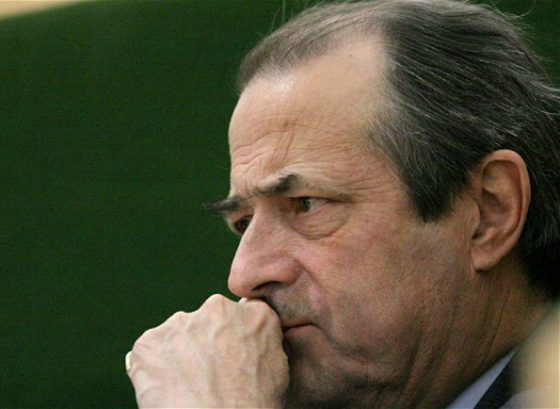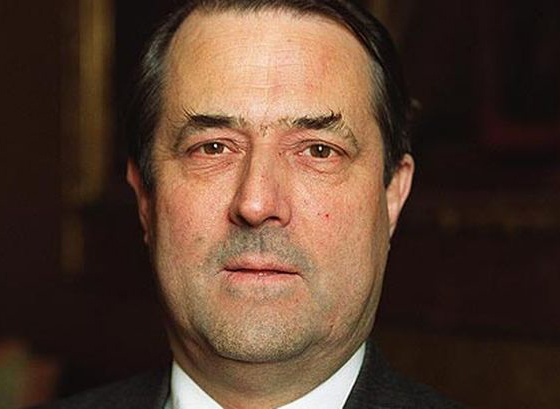Trump responsible for consequences of withdrawal from Iran Deal: UK ex-envoy to Iran

The US President Donald Trump is squarely responsible for the consequences of his country’s withdrawal front Iran Deal, said the former ambassador of the United Kingdom in Tehran, AVA Diplomatic reports.
‘I agree with the statements of Mrs. May and Mrs. Merkel and Messieurs Macron about the significance of the JCPOA for European security and for the Middle East security and for the Non-Proliferation of nuclear weapons,’ Richard Dalton said.
Dalton was the UK ambassador in Tehran from 2003 to 2006, and after retirement he became a member of Chatham House think tank and has recently been appointed to the deputy head of Iran-Britain chamber of commerce.
Calling the Joint Comprehensive Plan of Action (JCPOA) ‘a major achievement’, he said that to set the deal aside when Iran is observing it is ‘a big mistake, which is damaging to the European Union and the European security and introduces yet more tensions in a very troubled region at a very dangerous time.’
Affronting the world and his long-term allies, US President Donald Trump unilaterally withdrew his country from the 2015 accord that was negotiated and signed by the permanent members of the UNSC plus Germany and unanimously confirmed in the international security body. The agreement was accepted and respected worldwide.
The world leaders, including the EU and the signatories the deal, expressed their discontent with Trump’s decision as soon as he announced his decision on May 8.
The 28 members of the European Union decided to revive the blocking law of 1996 in their meeting in Sofia, Bulgaria. The UK, France and Germany had already promised to take measures to counter the new sanctions imposed on Iran by the US.
Dalton said that he doesn’t agree with Trump’s ‘level of hostility to Iran’.
Answering a question about why Trump paid no attention to the UK’s advice regarding the JCPOA, the former UK diplomat said, ‘Britain and the United Stated have always had different policies on Iran. The United Kingdom has believed in diplomatic engagement with Iran in developing trade and commercial links, in building on the common interests that we have in achieving stability in the Middle East and trying to narrow the gap through negotiation and discussion that have always existed between our two countries on vital matters, such as Israel and Palestine, terrorism, human rights questions and, until 2015, nuclear matters.’
He also said that one reason is that the US policy toward Iran which is shared by the EU, Russia, China and the rest of the world ‘has been vindicated by results’.
‘We disagree with the different view which the Unites States have taken over the years about importance of isolating Iran.’
The second reason, which is broader than the first one is that ‘the US and the UK have adopted different approaches to the problems of the Middle East,’ he said.
‘It is not true to say that our close relationship with the Unites States means that we will always eye to eye with them. And on the matter of the application if sanctions for example to Cuba in the 1990s and on other matters we have taken a different view.’
Dalton added, ‘We supported measures to resist the imposition of US sanctions extraterritorially on European companies in the past and we are going to do so again in this context.’
Answering a question about London and Washington’s disagreements and if London is ever thinking to change or revise its policy toward the US at all, he said, ‘No. We have vital defense relationships with the United States through the North Atlantic Treaty Organization, as do our European partners. And we will remain fateful to our undertakings under North Atlantic Treaty.’
Secondly, he said, the US and the UK made huge investments in each other’s economies and those vital economic relationships are essential and will continue.
Thirdly, although the two countries may differ with each other in the Iranian nuclear issue or even the policy toward Iran, the UK needs to work with the UN in the context of the UNSC and many other international issues the UNSC is addressing.
Also, the British and the Americans have common ancestry and common cultural connections that are not going to be affected at all.
Answering a question whether the US’ unilateral withdrawal from some international treaties, including the JCPOA, causes the UK to take a different path from that of the US so that the US administration become aware of the consequences of such decisions, Dalton said, ‘Absolutely, and the nine areas agreed in European discussions on how to react to US withdrawal from the JCPOA on Tuesday in Brussels indicate that Britain with its partners will be determined in marking the difference and making sure that United States feels the heat of this disagreement.’
He added, ‘Among those nine points are protecting European companies from the effective US extraterritorial sanctions in the Iran context continuing to allow Iranian sales of oil into the European market and continuing trade and investment. Of course, as Iranian ministers have recognized in their public statements, our economies are largely made up of private organizations and they can’t be forced to trade with Iran and there will be some who withdraw.’
Saying that he is not the member of the government any more, he said that some measures have been taken ‘to enable those companies that wish to continue their involvement with Iran to do so, including by new forms of finance to replace the financial facilities that have not been available hitherto despite the JCPOA in the last two years’ in order that ‘the benefits that are due to Iran under the JCPOA can continue to be delivered.’
He also said that he was ‘optimistic’ about the future of the JCPOA; he quoted Frederica Mogherini saying, ‘We stay, you stay; you stay, we stay.’
About the financial institutions’ problems in dealing with Iran, in spite of the fact that there was a nuclear deal and the US was present in it, and the fact that Iran is nervous now because the US has pulled pit of the deal, he said that European countries have announced that they are going to come up with a formula, but it is not going to be easy.
The French and Italian governments have already announced that government supported lines of credit, using financial channels which are not subject to retaliation by the United States, but they may not materialize.
‘The British-Iranian Chamber of Commerce hopes that there will be a new urgency and a new determination and additional political will amongst European countries to make a reality of such ideas and to expand the amount of financial capability that their facilities can have.’
About the British-Iranian banks resumption, he said that they have always had vital role in financing trade, but their activities have been hampered because they cannot access to the British banks. ‘It is high time that problem was solved.’
He also said it was ‘most unfortunate’ that the head of the Iranian Central Bank has been sanctioned by the US, adding, ‘The central banks of our countries and the Iranian central bank need to be able to cooperate freely.’
Regarding the possible pressures of the US on the European partners to come out of the JCPOA, he said that he ‘didn’t think there is any chance now of that’.
‘Not only have the three governments that cooperated mostly on this matter since 2002 – Britain, France and Germany- declared their commitment to the JCPOA, so have European foreign ministers, and so have European heads of government at the level of all 28.’
‘So I don’t foresee any country being drawn away from commitment to the JCOPOA by the United States.’
Answering a question regarding who is responsible for consequences of the US withdrawal from international deals, namely UNESCO, Paris agreement, and the JCPOA, he said, ‘President Trump.’
He said the US Secretary of State Mike Pompeo was ‘hoping that there will be a little extra time for the negotiation between the European counties and the United States to find a formula which would enable President Trump to change his mind, but he was not given that opportunity.
‘President Trump chose not only to cut off the discussions, but to disregard progress that has been made.’
‘So, both through his long-term determination to sabotage the agreement and his disregard of his allies and disregard of multilateral solutions to gravest world problems, the blame and the responsibility lies squarely on the president of the United States.’
Dalton said that the relations between the US and the rest of the world have been getting steadily more complicated and full of problems.
He also said that the UK regrets Trump’s decisions on international cooperation; and now the disagreement over Iran nuclear deal is ‘one more disappointment and setback’.
‘The world needs more cooperation, rather than less.’




